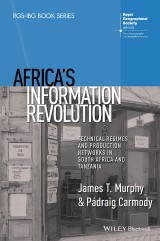Details

Africa's Information Revolution
Technical Regimes and Production Networks in South Africa and TanzaniaRGS-IBG Book Series 1. Aufl.
|
25,99 € |
|
| Verlag: | Wiley-Blackwell |
| Format: | EPUB |
| Veröffentl.: | 20.01.2015 |
| ISBN/EAN: | 9781118751305 |
| Sprache: | englisch |
| Anzahl Seiten: | 280 |
DRM-geschütztes eBook, Sie benötigen z.B. Adobe Digital Editions und eine Adobe ID zum Lesen.
Beschreibungen
<p><b><i><i>Africa’s Information Revolution </i></i>was recently announced as the 2016 prizewinner of the Royal Academy for Overseas Sciences - congratulations to the authors James T. Murphy and Padraig Carmody!</b></p> <p><i>Africa’s Information Revolution</i> presents an in-depth examination of the development and economic geographies accompanying the rapid diffusion of new ICTs in Sub-Saharan Africa.</p> <ul> <li>Represents the first book-length comparative case study ICT diffusion in Africa of its kind</li> <li>Confronts current information and communication technologies for development (ICT4D) discourse by providing a counter to largely optimistic mainstream perspectives on Africa’s prospects for m- and e-development</li> <li>Features comparative research based on more than 200 interviews with firms from a manufacturing and service industry in Tanzania and South Africa</li> <li>Raises key insights regarding the structural challenges facing Africa even in the context of the continent’s recent economic growth spurt</li> <li>Combines perspectives from economic and development geography and science and technology studies to demonstrate the power of integrated conceptual-theoretical frameworks</li> <li>Include maps, photos, diagrams and tables to highlight the concepts, field research settings, and key findings</li> </ul>
Series Editors’ Preface viii <p>Acknowledgements ix</p> <p>Abbreviations xi</p> <p>Introduction xiii</p> <p>1 ICT4D: The Making of a Neoliberalized Meta-discourse (with Bjoern Surborg) 1</p> <p>2 ICTs and Economic Development in Africa: Theorizing Channels, Assessing Impacts 25</p> <p>3 ICTs, Industrial Change, and Globalization in Africa: A Conceptual Framework 47</p> <p>4 ICTs in Action: SMMEs and Industrial Change in South Africa and Tanzania 73</p> <p>5 ICT Integration, Sociotechnical Regimes, and Global Production Networks 113</p> <p>6 Downgrading and Differentiation in African SMMEs 147</p> <p>7 Emerging Regime and GPN Configurations: Neo-intermediation and ICT-enabled Extraversion (with Bjoern Surborg) 176</p> <p>8 Conclusion 200</p> <p>References 215</p> <p>Index 243</p>
<p><b>James T. Murphy</b> is Associate Professor at Clark University’s Graduate School of Geography. He is co-author of <i>Key Concepts in Economic Geography</i> (2011). </p> <p><b>Pádraig Carmody</b> is Associate Professor in Geography at Trinity College Dublin, where he co-directs the TCD-UCD Masters in Development Practice and Research Fellow in the Department of Geography, Environmental Management and Energy Studies at the University of Johannesburg. His books include <i>The New Scramble for Africa</i> (2011) and <i>The Rise of the BRICS in Africa</i> (2013).</p>
<p>The African continent is home to more than 700 million mobile phone users—and its rate of computer and internet penetration has increased exponentially in the past decade. What are the structural implications of Africa’s current “information revolution?” <i>Africa’s Information Revolution</i> presents an in-depth examination of the development and economic geographies accompanying the rapid diffusion of new ICTs in Sub-Saharan Africa. Based on more than 200 interviews with firms from a manufacturing and service industry in Tanzania and South Africa, the authors integrate concepts from economic geography, political economy, and science and technology studies to explain the impacts and implications of ICT adoption for African economies. Through their critical interrogation of Africa’s industrial development in an age of deeply informationalised capitalism, the authors develop and advance new theoretical concepts—including “neointermediation” and “thin” and “thick” forms of ICT integration. They also reveal that even as ICTs are absorbed into the everyday routines and practices of firms, the benefits of these technologies are being off-set by a simultaneous increase in the power that foreign companies hold over African economies. By balancing in-depth field research with innovative conceptual-theoretical perspectives, <i>Africa’s Information Revolution</i> offers illuminating insights into the relationships between ICTs and Africa's growing role in the global economy.</p>
'Murphy and Carmody have made an important contribution to the literature on the role of ICT in developing countries. Central to their analysis is a critique of technologically deterministic approaches to the debate. They go well beyond traditional 'impact studies' to consider the structuralist context in which ICT is applied. This leads to a fresh set of conclusions that will in my opinion be widely cited.' <br /> <b>— Jeffrey James, Professor of Development Economics, Tilburg University, The Netherlands</b> <br /> <br /> 'Drawing on detailed and original empirical research, this book makes a valuable contribution to our understanding of the dynamics of upgrading and downgrading in Global Value Chains and Global Production Networks. The book will be of considerable interest to researchers, students and policymakers.'<br /> <b>— Raphael Kaplinsky, Professor of International Development, The Open University, UK</b>
Diese Produkte könnten Sie auch interessieren:

Observing Systems for Atmospheric Composition

von: Guido Visconti, Pietro Di Carlo, W. Brune, M. Schoeberl, Andreas Wahner

149,79 €















